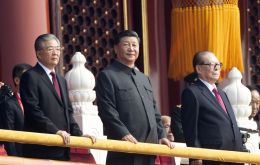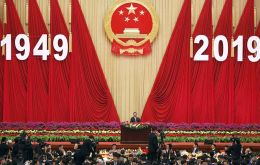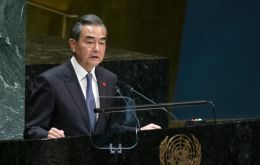MercoPress. South Atlantic News Agency
Tag: China
-
Thursday, October 3rd 2019 - 09:54 UTC
Developing nations foreign debt reaches US$ 7.8 trillion, World Bank report

Total foreign debt held by developing nations jumped more than 5% to US$7.8 trillion, driven by a surge in Chinese debt, the World Bank said in a report on Wednesday.
-
Thursday, October 3rd 2019 - 09:18 UTC
China's hog herd drops to half because of the African swine fever

China's hog herd fell by half in the first eight months of 2019 due to a devastating outbreak of African swine fever and will likely shrink by 55% by the end of the year, analysts at Rabobank said on Wednesday.
-
Wednesday, October 2nd 2019 - 09:00 UTC
China displays its military muscle with an impressive parade on the 70th anniversary of the communist revolution

China celebrated its growing power and confidence with a big display of military hardware and goose-stepping troops in Beijing on Tuesday, overseen by President Xi Jinping, who pledged peaceful development on Communist China’s 70th birthday.
-
Tuesday, October 1st 2019 - 09:49 UTC
Xi's message to Hong Kong: Beijing will uphold “one country, two systems”

Chinese President Xi Jinping vowed on Monday to uphold the “one country, two systems” principle in Hong Kong, after months of protests in the semi-autonomous city.
-
Saturday, September 28th 2019 - 09:40 UTC
China opens the world's largest terminal airport which is to handle 170m pax by 2025

China's new US$ 11 billion mega airport has opened its doors, days before the country's 70th-anniversary celebrations. The Daxing International sea star-shaped airport in the capital Beijing was formally opened by President Xi Jinping and is the largest in the world.
-
Saturday, September 28th 2019 - 09:40 UTC
China slams Trump for the trade disputes but says Beijing will act in a calm, rational manner

China's top diplomat said on Friday that tariffs and trade disputes could plunge the world into recession and Beijing was committed to resolving them in a “calm, rational and cooperative manner.”
-
Wednesday, September 25th 2019 - 09:04 UTC
Brazilian farmers face the challenge of African Swine Fever impact in China

Chinese commodities trader COFCO said it expects a sharp drop in the number of soybeans it will source for export from Brazil this year due to an outbreak of African Swine Fever (ASF) in China that has hurt demand for animal feed.
-
Tuesday, September 24th 2019 - 07:32 UTC
Trump increases pressure on China to buy farm products

U.S. President Donald Trump on Monday questioned a decision by his top trade negotiators to ask Chinese officials to delay a planned trip to U.S. farming regions after trade talks last week, saying he wanted China to buy more American farm products.
-
Monday, September 23rd 2019 - 13:20 UTC
Experts predict that US-China trade war deal may be imminent

Prominent Chinese economist Chen Wenling has recently advised that a trade deal between the United States and her home country may be imminent, marking the beginning of the end for the damaging conflict between these two nations.
-
Tuesday, September 17th 2019 - 09:41 UTC
Chinese mining group plans to build an US$ 2.2bn complex in Brazil

The Brazilian state of Minas Gerais has signed a protocol of intent with Sul Americana de Metais, a unit of Chinese miner Honbridge Holdings, for the construction of a 9.1 billion reais (US$ 2.2 billion) mining complex, newspaper O Estado de Sao Paulo reported.
